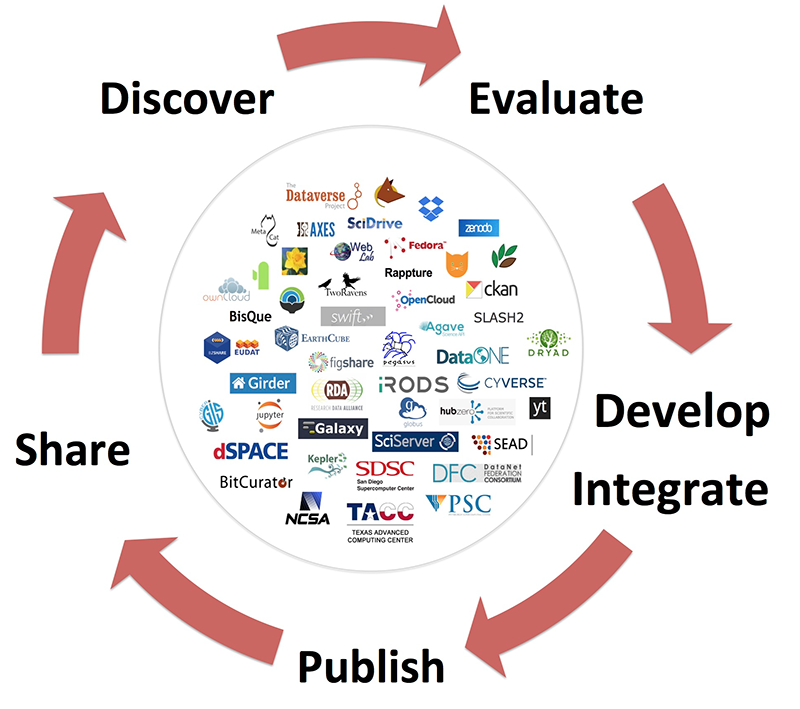The data management landscape is diverse with many tools and services being actively developed within different scientific communities, spanning a variety of requirements. Navigating these technologies for project or institution data management needs is thus challenging, especially where no one technology is sufficient and a combination of several services is required (e.g. as is the case in establishing a U.S. National Data Service that broadly supports scientific needs). Towards both simplifying the landscape and fostering the interoperability needed to allow for these components to be mixed and match, the National Data Service Consortium has established NDS Labs consisting of the NDS Labs Workbench, OpenStack resource allocations, and collaborative support for software development activities.
NDS Labs Workbench
 The NDS Labs Workbench provides quick access to encapsulated data management tools and services so that they can be quickly deployed for evaluation and development purposes. One might think of this as an "App Store" for data management software allowing users to deploy such services from within their browser.
The NDS Labs Workbench provides quick access to encapsulated data management tools and services so that they can be quickly deployed for evaluation and development purposes. One might think of this as an "App Store" for data management software allowing users to deploy such services from within their browser.
What can a user do with the NDS Labs Workbench?
- Discover available data management tools and services
- Compare/evaluate various technologies
- Deploy test instances
- Cloud-based development
- Publish/share your tools for others to discover
How to Request Access to Workbench
You can request access to the Workbench by registering for an account. See the User's Guide for information about how to use the system.
Who will be granted access to Labs Workbench?
- RDA and NDS Consortium members
- Data management tool developers
- PIs and staff on related projects
- You!
NDS Labs OpenStack Resource Allocations
Leveraging resources such as SDSC Cloud , TACC Rodeo , and NCSA Nebula we provide an environment where developers can prototype tools and capabilities that help build out a NDS framework and its services. Users of this environment have access to significant storage, machines that can run services, and a variety of useful data management and manipulation tools (e.g. databases, storage management systems, repository applications, etc.). Provided allocations enable a developer or small team of developers to explore an innovative idea, prototype a service, or connect existing applications as part of building an NDS ecosystem.
What do you get?
- Hosting of services
- Access to elastic computational resources (Virtual Machines)
- Access to storage
How to Request Allocations
You can obtain an NDS Labs resource allocation by completing an application for a pilot project with the NDSC, which unlocks a premium account. A successful pilot project should develop/deploy:
- A tool for discovering data across multiple communities or data systems
- A data publishing tool or example that demonstrates a widely applicable feature that makes the underlying data either easier to publish or easier to re-use
- A new service or tool that makes it easier to re-use data in a repository
- A demonstration of connecting together multiple data systems to provide an important, higher-level functionality
- A demonstration of prototype "standard" that allows systems to interoperate
- A demonstration of an RDA deliverable
NDS Labs Collaborative Support
Leveraging Research Software Engineers at NCSA , SDSC , Argonne National Lab , and the University of Notre Dame the NDSC provides collaborative support for software development activities that further the NDS mission. Collaborative support staff work on data cyberinfrastructure efforts spanning NSF , NIH , NIST , DOE , etc. and bring this experience and knowledge of data technologies to the development activities within the pilot efforts supported.
What do you get?
- One to three months of software development/user support
- Opportunities to directly interact with other data cyberinfrastructure efforts through a shared staff
How to Request Collaborative Support
You can obtain collaborative support in the same manner as that of requesting an OpenStack allocation, by completing an application for a pilot project with the NDSC and request collaborative support.